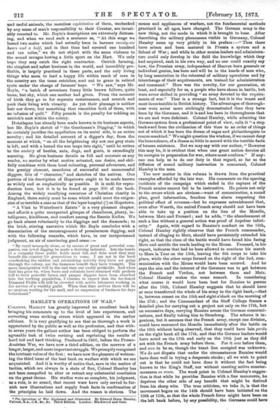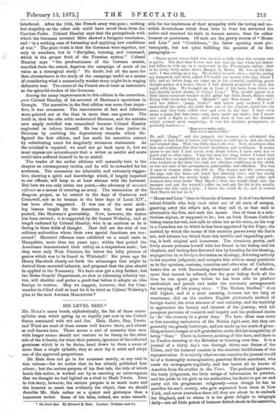HAMLEY'S OPERATIONS OF WAR.*
CotoxEr. HAMLEY has greatly improved an excellent book by bringing his comments up to the level of late experiences, and correcting some striking errors which appeared in the earlier editions. It is very gratifying to see that so thorough a work is appreciated by the public as well as the profession, and that with- in seven years the gallant author has been obliged to perform the agreeable task of twice revising and reprinting the results of hard toil and hard thinking. Produced in 1866, before the Prusso- Austrian War, we have now a third edition, on the morrow of a longer, larger, and more important struggle. We promptly recognised the intrinsic value of the first ; we have now the pleasure of welcom- ing the third issue of the beat book on warfare with which we are acquainted. And it is worthy of notice that, save in the matter of tactics, which are always in a state of flux, Colonel Hamley has not been compelled to alter or retract any substantial conclusion on the great theme. His studies were so complete, his judgment, as a rule, is so sound, that recent wars have only served to fur- nish new illustrations and supply fresh facts in confirmation of the principles he laid down. And the reason is obvious. The * The Operations of War Bzplained and Illustrated. By Edward Bruce Hamley, Colonel, EA., C.B., &c., &c. Third Edition. London : Blackwood and Sons. means and appliances of warfare, not the fundamental methods practised in all age', have changed. The German army is the new thing, not the mode in which it is brought to bear. After describing the military phenomena visible in Germany, Colonel Hensley sums up very pithily in his preface :—" Thus there have arisen and been matured in Prussia a system and a School of War ; and while in other armies leaders and administra- tors could only develop in the field the knowledge which they had acquired, each in his own way, and no one could exactly say how, the Prussian army, independent of Heaven-born generals or individual genius, has been and will be in the hands of men who„ by long association in the rehearsal of military operations and by interchange of their acquirements, are trained for administration and command." Here was the novelty, for our generation, at least, and especially for us, a people who have shone in battle, but were never skilled in providing "an army devoted to the require- ments of war." That is a strange fact, but it is the truest and most incontestible in British history. The advantages of thorough- ness were never more strikingly demonstrated than they have. been by the Germans, and it is and has been in thoroughness that. we are and were deficient. Colonel Hawley, while admiring the German system from a professional point of view, calls it "a step. backward from the civilisation of this time to an order of things. out of which it has been the dream of sages and philanthropies to. rescue mankind." We might question the wisdom, if we cannot deny the benevolence, of a dream so little in accord with the terrible facts. of human existence. But we may say with our author, " However this may be, it is evident that when one great nation devotes all its energies to preparation for war, others must conform." It any- one can help us to do our duty in that regard, so far as the diffusion of sound military instruction is concerned, Colonel Hawley is the man.
The new matter in this volume is drawn from the practical examples afforded by the late war. His comments on the opening incidents of the campaign which ended in the capture of the French armies cannot fail to be instructive. He points not only to the errors which are obvious—want of concentration, a sound plan, good information, freedom from alarm respecting the political effect of reverses—but he expresses astonishment that„ even after Woerth, the united French army should not have been able to take up a position on the line of the Moselle, between Metz and Frouard ; and he adds, "the abandonment of such a line without a general action was proof of hopeless inferi- ority." Again, with regard to Bazaine's conduct on the 16th, Colonel Hawley rightly observes that the French commander„ instead of clinging to Metz, should have persistently extended his right, so that the close of the battle would have found him facing Metz and astride the roads leading to the Meuse. Frossard, in his. report, indicates that had he been allowed to continue his march to Mars la Tour on the 15th, leaving the 6th corps to take his. place, while the other corps formed on the right of the 2nd, com- munication with the Meuse would have been secured. And he says the aim and the interest of the Germans was to get between the French and Verdun, not between them and Metz_
Colonel Henley makes the same remark. In considering what course it would have been best for Bazaine to pursue after the 16th, Colonel Hawley suggests that he should have- at once transferred the whole of his army to the right bank,—that is, between sunset on the 16th and eight o'clock on the morning of the 17th; and the Commandant of the Staff College frames a detailed plan for carrying out a project not only on the 17th, but on successive days, carrying Bazaine across the German communi- cations, and finally taking him to Strasburg. The scheme is in- genious, but it assumes that the French army, except one division, could have recrossed the Moselle immediately after the battle on the 16th without being observed, that they could have lain perdts on the right bank all the 17th, and that the German leaders would have acted on the 17th and early on the 18th just as they did act with the French army before them. For it was before them, and seen to be so, though the xact line occupied was unknown. Wedo not dispute that under the circumstances Bazaine would have done well in trying a desperate stroke ; all we wish to point out is that he could not have done it without the fact being known to the King's Staff, nor without meeting active counter- measures en route. The weak point in Colonel Hamley's sugges-
tion is that while he provides Bazaine with a fine manceavre, he deprives the other side of any benefit that might be derived from his sharp wits. The true criticism, we take it, is that the
1 movement begun on the 14th should have been initiated on the 10th or 11th, so that the whole French force might have been on the left bank before, by any possibility, the Germans could have
interfered. After the 16th, the French army was gone ; nothing but stupidity on the other side could have saved them from the Caudine Forks. Colonel Hamley says that the promptitude with which the Germans invested Metz showed a foregone conclusion, and "is a striking case of foreseeing and applying new conditions of war." The plain truth is that the Germans were superior, not only in numbers, but in "discipline, training, and command, which is the proper fruit of the Prussian system." Colonel Hamley says "the predominance of the German armies, manifest from the outset, deprives the campaign of much of its value as a strategical study." No doubt, but all the more for that circumstance is the study of the campaign useful as a means of considering what a numerically weaker army might do in waging defensive war. The errors of the French are at least as instructive as the splendid strokes of the Germans.
Among the many improvements in this edition is the correction, pace Colonel Hamley, of his account of Sherman's operations in Georgia. The narrative in the first edition was more than imper- fect, it was erroneous. The inaccuracies of fact and inference were pointed out at the time in more than one quarter. The truth is, that the able critic underrated Sherman, and the mistake now amply rectified was committed because Colonel Hamley neglected to inform himself. He has at last done justice to Sherman by omitting the depreciatory remarks which dis- figured the first edition, and has made his narrative correct by substituting exact for singularly erroneous statements. As the mischief is repaired, we need not go back upon it, but we must express our astonishment that a writer so careful and acute could have suffered himself to be so misled.
The reader of the earlier editions will naturally turn to the chapter on contemporary tactics, and he will be rewarded for his acuteness. The comments are admirable and extremely sugges- tive, showing a spirit and knowledge which, if largely imparted to our officers, will keep us at least abreast with the foremost.
But here we can only notice one point,—the advocacy of mounted riflenzen as a means of covering an army. The restoration of the dragoon proper, as he existed in the days of Gustavus and Cromwell, not as he became in the later days of Louis XIV., has been often suggested. It was one of the most strik- ing lessons taught by the American war, but was pooh- poohed, like Sherman's generalship. Now, however, the notion has been revived ; it is supported by Sir Garnet Wolseley, and at length endorsed by Colonel Hamley, who is as cautious as he is daring in these fields of thought. How dull are the wits of our military authorities where their own special functions are con- cerned! Mounted riflemen were exhibited on a small scale in Hampshire, more than ten years ago ; within that period the Americans demonstrated their utility on a stupendous scale ; but they were only West Pointers, far below the lofty plateau of genius which was to be found in Whitehall ! Six years ago Sir Henry Havelock clearly set forth the advantages that might be derived from mounted infantry, and proposed that the plan should be applied to the Yeomanry. We have now got a step farther, but the Horse Guards' Department, so slow in reforming infantry tac- tics, will shudder and potter a good deal before it adopts an idea foreign to routine. May we suggest, however, that the Com- mander-in-Chief shall at least let it be tried on Colonel 1Volseley's plan at the next Autumn Manoeuvres?



































 Previous page
Previous page